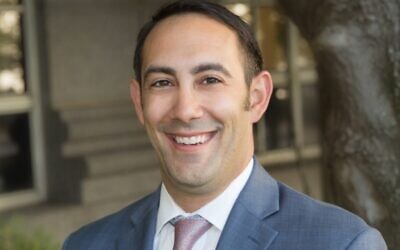Georgia’s Anti-BDS Law Imperiled
A federal judge has ruled that the law’s requirement of a pledge not to engage in a boycott of Israel ‘is unconstitutional compelled speech.’
Dave Schechter is a veteran journalist whose career includes writing and producing reports from Israel and elsewhere in the Middle East.
The viability of the Georgia law designed to thwart anti-Israel boycotts is in doubt after a federal judge declared the measure to be unconstitutional.
That finding came in a May 21 ruling by U.S. District Court Judge Mark Cohen in U.S. District Court for the Northern District of Georgia, as he rejected a request to dismiss a lawsuit challenging the law.
Though Cohen did not formally strike down the law, “It’s clear enough what’s going to happen eventually,” Marc Stern, chief legal officer of the American Jewish Committee, told the AJT.
The Georgia law took effect April 26, 2016, when then-Gov. Nathan Deal signed SB 327. The measures requires that any person or company contracting with the state for services valued at $1,000 or more agree not to boycott Israel. The legislation was the General Assembly’s response to the BDS [Boycott, Divestment, Sanctions] movement, which seeks to use economic pressure to force change in Israeli policies regarding the Palestinians.

The case before Cohen began in September 2019, when independent journalist and filmmaker Abby Martin was invited to be the keynote speaker at the February 2020 International Critical Media Literacy Conference at Georgia Southern University’s Savannah campus. Martin was to receive a $1,000 honorarium and travel expenses. A “Memorandum of Agreement” sent to Martin included a requirement that “You certify that you are not currently engaged in, and agree for the duration of this agreement not to engage in, a boycott of Israel.”
Martin, an outspoken critic of Israel, responded to the contact with an email that said: “I’m sure you know, a lot of my work advocates the boycott of Israel, and my new film features that call to action. I cannot sign any form promising not to boycott Israel.”
Martin’s invitation was withdrawn, and the conference was canceled.

The Georgia chapter of the Council on American-Islamic Relations, the CAIR Legal Defense Fund, and the Partnership for Civil Justice Fund filed suit Jan. 10, 2020, alleging that Martin’s rights under the First and Fourteenth amendments of the Constitution had been violated. Named as defendants were Steve Wrigley, chancellor of the Board of Regents of the University System of Georgia; Kyle Marrero, the president of GS, and three GS staff employees.
Cohen rejected a motion by the state’s lawyers to dismiss the case, writing in a 29-page option that: “The requirement contained in [the Georgia law] that parties seeking to contract with the state of Georgia sign a certification that they are not engaged in a boycott of Israel also is unconstitutional compelled speech. … Similarly, the State may not condition employment on an oath denying past, or abjuring future/protected speech and associational activities. … The certification that one is not engaged in a boycott of Israel is no different than requiring a person to espouse certain political beliefs or to engage in certain political associations. The Supreme Court has found similar requirements to be unconstitutional on their face.”
Cohen, whose undergraduate and law school degrees are from Emory University, was nominated to the federal bench by then-President Barack Obama in December 2013 and confirmed on a voice vote by the Senate in November 2014.

In a May 24 statement, Martin pronounced herself “thrilled” by Cohen’s statement about the law’s constitutionality. “My first amendment rights were restricted on behalf of a foreign government, which flies in the face of the principles of freedom and democracy. The government of Israel has pushed state legislatures to enact these laws only because they know that sympathy and support for the population they brutalize, occupy, ethnically cleanse and subject to apartheid, is finally growing in popular consciousness — they want to hold back the tide of justice by preemptively restricting the right of American citizens to peacefully take a stand against their crimes,” she said.
At least 35 states have some form of anti-BDS law, resolution or executive order, several of which have been challenged in federal courts on First Amendment, free speech grounds.
Georgia has the option of asking a federal appellate court to reverse Cohen’s ruling. The state attorney general’s office said that it had no immediate comment, but a spokeswoman pointed the AJT to a brief it filed in July, rejecting Martin’s argument that law restricted her free speech and rights of association. In that filing, the state said: “Had Martin contracted with GS (and had the conference not been canceled), nothing would have precluded her from devoting her entire keynote speech to criticism of Israel and its policies, to expressions of support for the BDS movement, to criticism of [Georgia’s law] or any other topic. … The statute requires only that those who desire to contract with Georgia be open to dealing, and not terminate any business activities, with Israel-affiliated persons or entities absent a valid business reason.”
During this year’s General Assembly session, the legislature considered a bill that would have raised the threshold for triggering the anti-boycott pledge from the existing $1,000 to $100,000. That bill passed the House, then was amended in the Senate, but the legislature adjourned without a final House vote. Georgia’s legislature works on a two-year cycle, thus the measure could return when the General Assembly reconvenes in January 2022.
The AJC said that the amended measure, designated House Bill 383, would not infringe on an individual’s right to free expression. Stern said that while increasing the threshold to $100,000 would not change the constitutionality question, the legislature could amend other language to address that issue.
Dov Wilker, regional director of AJC Atlanta, said, “It received tremendous bipartisan support in both chambers. We look forward to the law being updated, which will enable it to withstand legal challenges.”
- Dave Schechter
- News
- Local
- Mark Cohen
- Marc Stern
- Governor Nathan Deal
- American Jewish Committee
- Abby Martin
- Council on American-Islamic Relations
- Partnership for Civil Justice Fund
- CAIR Legal Defense Fund
- Steve Wrigley
- First Amendment
- 14th Amendment
- Kyle Marrero
- President Barack Obama
- Emory University
- Dov Wilker
- House Bill 383
- Supreme Court




comments